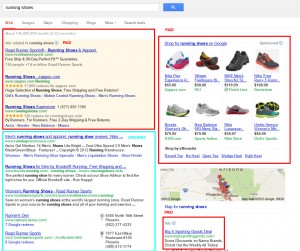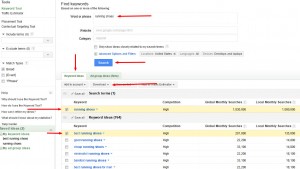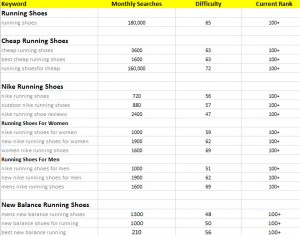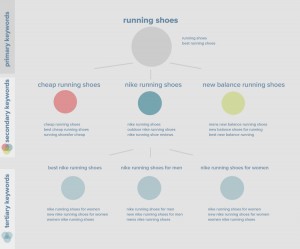If you haven’t heard that keyword research is one of the most important steps for an effective SEO foundation, now you have. It is the foundation of all other SEO activities. Finding and targeting good SEO keywords will guide the content on your site, help find relevant links, and target the most relevant group of people who want your business.
What are keywords?
Keywords are the words and phrases that a typical customer might type into a search engine to find your business. In the most basic form, if I sell running shoes, then my goal would be to show up in the top position when someone types “running shoes” into a search engine.
Keyword Research
In order to find the right keywords we recommend getting a birdseye view of your business and the current SEO landscape for your industry. Here are the steps we take when starting our research:
STEP 1: Keyword Difficulty Research
- Write down some keywords you think are appropriate for your business.
- Go to Google and type in your keywords in the search bar.
- Look for who/what shows up as the top results in the Paid and Organic section
- Typically if there are a lot of ads on the results page then the SEO competition is typically
equally as competitive. - If the majority of the organic results are competitors then we are on the right track.
- Do this for all your products and services and take notes of who the common competitors are.
STEP 2: Keyword Expansion and Search Volume
Now that you have some keywords go to:
https://adwords.google.com/o/KeywordTool and put your keywords in where it says “keywords or phrase” and search.
Google will then spit out some more related keywords for you to review with their associated search volume. Select all the keywords that seem relevant for your business and export them into a csv file to open and manage in excel.
Another way to expand your keywords is to check your analytics data for the non-branded keywords that are currently driving traffic for your site.
STEP 3: Finalizing keywords
Take your keyword list and review if for all relevant keywords with any search volume. Organize them according to topical relevance. This will help you organize other SEO activities such as title tags, meta, tags, inbound links, and content optimization.
WARNING: Do not go after the keywords with high search volume. If the search term “brown shoes” gets 50,000 monthly searched and “shoes” gets 1,000,000 resist the urge to try and justify including it as a keyword. This is because the shorter the keyword the more difficult it will be to rank and typically the less conversions you will get from it. An ideal keyword for your SEO campaigns will have 2 to 3 words in it.
TIP: Relevancy is your best friend.
STEP 4: Ongoing Keyword Maintenance
A great way to follow up on the progress of your campaign is to review your analytics data. When review keywords look for questions people are asking and new keywords that you can implement into campaign that would be helpful for users. For example, if during your keyword review you find visiting originating from the keyword “what dresses can I wear with running shoes.” Write a blog post about it and address the concern head on. This will be a great source of finding these new content ideas and scooping up some nice traffic.
TIP: You should frequently review your keyword strategy and adjust where necessary.
Miscellaneous: Tips and Tricks for Keyword Ideas:
If you still feel like you do not have a good handle on your keywords a shortcut would be to go to your competitors websites and look at the title tags on their homepage. This should give you an idea of their most important keywords. Use these as a starting point and see if you should be targeting these as well.
Long Tail vs Short Tail Keywords
Long tail and short tail are words that describe the type of search query. It can be easily be understood by the number of words used in the query as well as how broad or specific the query is. A good illustration would be:
- No Tail = “shoes”
- Short Tail = “running shoes” or “cheap running shoes”
- Long Tail = “cheap air max nike running shoes”
We recommend targeting short tail keywords that are relevant to your business. The deeper you get into your site the specific the content usually becomes and the longer the tail of the keywords.
Don’t Forget Your Branded Keywords
Here is a little secret. Google does not distinguish between brands. What I mean is, there is not a special branded algorithm that identifies your brand and then gives it special treatment. The algorithm does not know how “cool” your company is. It can only gauge the relevance, trust, and authority for a specific query as it relates to your site.
To the right is an example for a local dental office in Orlando. See how they control the majority of the real estate on the SERPS (search engine results page) for their brand name. This is a good example that shows Google is very confident about your brand. Also, notice the sitelinks underneath the first result. Sitelinks are a good indicator that Google understands specifically what users want when searching for your brand name. This is because Google only shows sitelinks for results they are confident will be useful to the user.
Why Are Branded Keywords Important?
1. Branded keywords will almost always have a higher conversion rate for eCommerce sites and for most others as well. There is a certain level of trust with visitors who searches for your brand. Wouldn’t it be nice if every visitor trusted you or was familiar with your brand.
2. Branded keywords boost traffic
3.Will show you growth and awareness for your brand
Keyword Research Tools
Here are some really helpful tools that I use when doing some more advanced keyword research.
Discovery
Ubersuggest.org
If you need help expanding your keyword list then this tool is a winner.
Keyword Competition
SEO Moz’s Keyword Difficulty Tool
This tool is the best that I have seen in determining a difficulty level for organic search terms.
Competitor Research
Sem Rush
If you have ever wondered what keywords your competitors are ranking for then look no further. This is a very powerful tool
It’s not always about getting visitors to your site, but about getting the right kind of visitors. The usefulness of keyword research cannot be emphasized enough. The tidal waves are coming and in this case you want to make sure you are right in front when they come crashing down. The stronger your keyword foundation is, the easier it will be for your business to adapt to the ever changing demands of search engines and customers.








